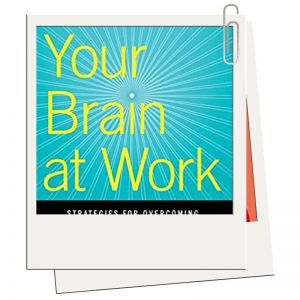 This is a book review of ‘Your brain at work’ by David Rock. The book provides solid research into how our brain functions best and suggestions to make the most of our brain at work. The book is broken up into 14 scenes where he provides examples of real work situations and how the brain moves through them. Here’s my take on the important parts of each scene.
This is a book review of ‘Your brain at work’ by David Rock. The book provides solid research into how our brain functions best and suggestions to make the most of our brain at work. The book is broken up into 14 scenes where he provides examples of real work situations and how the brain moves through them. Here’s my take on the important parts of each scene.
Scene 1: The morning email overwhelm
- Conscious thought involves billions of neural connections in the brain.
- Thinking uses up resources, and some mental processes take up more energy than others. Prioritising tasks is mentally taxing.
- Try doing mental heavy lifting early in the day and ensure you manage your to do list effectively to reduce taxing your brain.
Scene 2: A project that hurts to think about
- Your attention and focus require effort to maintain. Holding things in the conscious mind is draining so try doing only one thing at a time.
- Learning something new is more taxing on the brain than doing something you’re familiar with.
- Multitasking damages the way your memory works.
- When faced with complex decisions, try to narrow the options to two, this eases the cognitive load on your brain.
Scene 3: Juggling five things at once
- Switching between tasks uses energy, decreases performance, diminishes memory and increases the chance of mistakes.
- Multitasking is only possibly when one of the tasks can be performed unconsciously, ie, brushing your teeth while thinking over your to do list.
Scene 4: Saying no to distractions
- Attention is easily distracted, and the brain finds distractions taxing.
- Rest periods are required to give your brain down time to rest and rejuvenate.
- Multitasking can reduce performance by similar amounts to the loss of a full night’s sleep, or smoking marijuana. Essentially reducing the male IQ by 15 points and the female IQ by 5points. (Hence why women can multitask more effectively then men.)
- Distractions decrease performance at work considerably.
- Try removing all distractions when you’re focusing on a single task and blocking out time.
Scene 5: Searching for the zone of peak performance
- There is a zone of peak performance that requires just the right level of stress.
- Norepinephrine and dopamine are two important neurotransmitters which support alertness and attention.
- Dopamine is produced through novelty, humour, hope or a shift in perspective.
Scene 6: Getting past a roadblock
- ‘Impasse phenomenon’ is when our brain gets stuck on a small and familiar range of solutions.
- Insights occur in a happy and well rested mind. Try to reduce pressure in high stakes situations to create more unique and viable solutions.
Scene 7: Derailed by drama
- The brain is primed to minimise dangers and maximise rewards.
- The limbic system can become aroused easily and holds our emotional impulses.
- The away response (our flight or fight mode) drains mental resources.
- Trying to suppress an emotion reduces mental functioning and diminishes memory.
- Labelling an emotion helps the prefrontal cortex re-activate and reduce activation in the limbic system.
Scene 8: Drowning amid uncertainty
- Certainty and autonomy are both rewards and threats to the brain.
- Reappraisal, or reframing are powerful ways to manage both certainty and autonomy.
 Scene 9: When expectations get out of control
Scene 9: When expectations get out of control
- Expectations shift the functioning of the brain. Managing them in positive ways can promote dopamine and minimise stress.
Scene 10: Turning enemies into friends
- Social connections are a primary need of our brain and are as important as food and water to our survival.
- Strong relationships take effort and opportunities to forge connections.
- We all make spontaneous judgements of others based on our preconceived ideas.
Scene 11: When everything seems unfair
- Fairness is a reward to the brain, while unfairness is perceived as a considerable threat.
- Try to be open and transparent in your dealings and perceptions of fairness to minimise your brain ending up in a fight or flight response.
Scene 12: The battle for status
- Status is a significant driver of behaviour at work.
- Elevation of statusactivates the reward centres of the brain, while status lowering activates the threat centres in the brain.
- Everyone experiences status differently. Learn to compete against yourself and work to build your internal status with learning and self acknowledgement.
- When others status is threatened, their worst behaviour will surface.
- Provide positive feedback to others to reduce any perceived status threat.
Scene 13: When other people lose the plot
- Ask questions to help others find their own path and wisdom, as opposed to giving answers.
- Help others recognise their thinking habits and help them shift to more positive ones.
Scene 14: The culture that needs to transform
- Change in the brain is constant and focused attention changes the brain.
- Our attention naturally drifts towards the threats, as opposed to the rewards.
- Long term change relies on your ability to focus on the positives and support others to do the same.
This was a good book and an interesting take on how your brain functions within a work environment. The neuroscience was fascinating; and the simple chapter summaries made it easy to take a snapshot view of the book without the many details provided. If you’re interested in how your brain functions at work, for both you and everyone around you, add ‘Your brain at work’ by David Rock to your reading list.



 Scene 9: When expectations get out of control
Scene 9: When expectations get out of control




